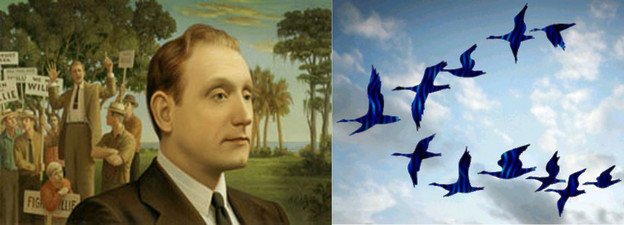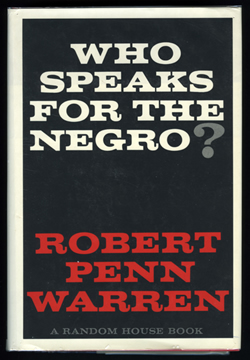Know what is happening in your heart
Why Robert Penn Warren irks me

Here is a poem by Robert Penn Warren called “Tell Me a Story”:
Long ago, in Kentucky, I, a boy, stood
By a dirt road, in first dark, and heard
The great geese hoot northward.
I could not see them, there being no moon
And the stars sparse. I heard them.
I did not know what was happening in my heart.
It was the season before the elderberry blooms,
Therefore they were going north.
The sound was passing northward.
This poem, which was required reading somewhere along the line, always irked me and I never bothered to think about why. (By the way, I saw and heard Warren read in person in maybe 1979 or 1980, at the University of Virginia, although I don't think he read the irksome poem. He did read “Bearded Oaks” as an encore and received a prolonged standing ovation.)
Why am I irked? I listened to a discussion of the evolution of Warren's racism (see below) and then I knew a little more about why. It’s the absolute way in which northward movement is naturalized. It happens, the young southerner doesn’t see it, can’t see it, won’t see it, and the logic (it’s a certain season and “therefore” they go north) is fixed. Sure, in the poem he's a young boy and so “I do not know what was happening in my heart” we ascribe to innocence and inexperience. And yet this is not the kind of northern migration that one will ever actually come to know by experience; it’s a priori true. There's a dishonesty here in the slight implication that later one will know what is in one's heart.
Later Robert Penn Warren, who had been a racist, thought of himself as a reformed racist.
Starting in 1964, Warren conducted a series of taped interviews with major civil rights leaders and literary figures of the time, including Martin Luther King, Malcolm X, Medgar and Charles Evers, Ralph Bunche, James Baldwin, Ralph Ellison, Richard Wright, and others. Think about it: Robert Penn Warren and Malcolm X.  These interviews formed the basis of Warren's 1965 book, Who Speaks for the Negro?, an exploration of the Civil Rights movement from the point of view of a “reformed racist.” After four years of negotiation with Yale’s Beinecke Library, conducted mostly by Dan Traister and Ancil George and instigated by the research of Kristina Baumli, Penn's Van Pelt library acquired copies of these tapes which, so far as the Yale people knew, had not been heard by anyone. In April 2005 Kristina organized with the Writers House a panel discussion about these recordings, co-sponsored by CPCW and Penn’s library.
These interviews formed the basis of Warren's 1965 book, Who Speaks for the Negro?, an exploration of the Civil Rights movement from the point of view of a “reformed racist.” After four years of negotiation with Yale’s Beinecke Library, conducted mostly by Dan Traister and Ancil George and instigated by the research of Kristina Baumli, Penn's Van Pelt library acquired copies of these tapes which, so far as the Yale people knew, had not been heard by anyone. In April 2005 Kristina organized with the Writers House a panel discussion about these recordings, co-sponsored by CPCW and Penn’s library.
Here is the audio recording of the panel, which includes some excerpts from the old tapes themselves. Participants are Ancil George, Paul Hendrickson Kristina Baumli and Anthony Sczcesiul of the University of Massachusetts at Lowell.
I take poems seriously and about this one I feel a terrible implication. Why did I not bother to figure out why the little poem about the southern boy sensing northward migration disturbed me? I did not know, the boy in the poem did not know, and I did not bother even to know why I did not know. The poem is finally about reproducing ignorance, which is defined here as inexorable reason for not seeing major change occurring around you. As if: first dark, best dark.
*
Rachel Blau DuPlessis, a regular reader of this commentary, wrote an edifying response to the above and here (with her kind permission) is what she wrote:
Dear Al—since I wasn’t irked but fascinated, I thought I’d write about Warren (whom I hardly have ever thought of...). Writing admiringly to you as usual. Chalk this one up to “not being able to participate in PoemTalk and missing it.” First, the division into stanzas mirrors an attenuation and sense of loss. 3 lines together, then 2 + 1 (twice). The one liners sort of match emotionally. Second, and I need to say: I liked this poem, innocently. I liked the off-rhymes of stanza 1. I liked the alliteration of great/geese and stars/sparse [that one fabulous] and even dirt/dark and the vowel assonance between dirt/heard (tho my accent might be different from his) as well as hoot/moon/blooms. It is a remarkable skilled poem - also the way the syntax moves from short phrases separated by commas whenever he talks about “I” (that is, in the first 5 lines of the 9 line poem) UNTIL the key line “I did not know what was happening in my heart.” At that line, the “I” is syntactically, not to say lyrically! integrated in a great sweeping, global line. From that point on “they” are the agent, and also “it.” “Logically” the poem reads: SINCE he does not know what is happening in his heart, THEREFORE they are escaping and going away. That is “if” he had known, then they would have stayed?? No—they are “geese” and not beholden to him. So the illogic of this mixed up sense of agency is part of the strangeness of the poem. Geese always fly north in the spring. His agency has nothing to do with it. Their migration is completely about nature. By the way—since “migration” is then one of the secret words, do we know whether when RPW wrote this poem (and when was that), the northward movement was called The Great Migration? A historical question. Anyway, in the Great Migration, and here you are dead on, Blacks were leaving (and were very beset AS they left as well as before, of course—cf. Jacob Lawrence’s series). The speaker’s agency in a very indirect way is responsible, but he is just a “boy.” If this is autobiographical, we can say RPW has no direct agency for (his and others’) racism and social/economic cruelty at that moment. Responsibility is already always “ELSEWHERE.” A space off the map of this poem “matches” the space off the map of this poem where the geese are going. "Kentucky" may be precise as a locale, but it is hardly up to matching those two other mysterious "elsewhere's." This is a poem about the loss of agency, a tremendously pained and nostalgic poem. It also somewhat confesses ….something. Something about desire, yearning—goodness only knows — certainly a desire for whatever is passing out of his life. Could he have been in love, connected to, cathected to someone who was leaving, and he remembers being troubled and aroused and upset by the loss, feelings which he had to suppress??? Since the birds will return, and one could have talked about that cycle of nature in the poem, part of the coiled contradiction in the poem is that he is mapping a human loss upon a natural cycle, claiming the loss to him of self-knowledge is just “natural.” So “what is happening in my heart” (and his inability to know what WAS happening) appears permanent (“the sound was passing northward” not “the geese were passing northward [and next winter would return]”). WHAT IS UNSPOKEN in this poem gives it its evocative quality. And this is doubly distanced by that bizarre title. After talking about ‘sound,” the title shifts to “story” as the naming of something. Story is solid; sound is more like Nate Mackey argues-—an emotional pipeline to a sense of orphic orphanhood. The title makes me ask: What story? Is he framing the poem as a “story”—just another tale? The title seems to contain and dry out the exposed yearning of the poem. Who is speaking this title? to whom? The title sounds like a child asking for a story from an adult. What child? What adult? THUS the detail word of condensation: “elderberry”—which is broken into components “older person / small fruit” is striking to me. I can’t go further with that, but it is acutely visible. The poem is a poem of mixed-up agency and mixed-up desire, and these two very buried things are mixed up with each other. How we are not certain...
Al to Rachel in response:
I'm really happy for and edified by your thoughts on that Warren poem. What you say about the title is important (and only clinches my sense of its oddness/mystery). The northern migration the story tells of is not vague as a natural fact; what's vague is how he feels about it and thus I keep thinking it’s not “just” the geese.
Rachel in response:
You are so right that it's not “just” the geese. And therefore I really wonder about the date of the poem and how it does encode the Great Migration. I think yours is a wonderful "contrapuntal" reading in Said's sense--that which is off the map of the text is central to the text. Said says this about slavery and fortunes made with it in relation to an Austen novel--I think it's Persuasion. I liked your reading a lot; I just also like the poem, too.
Now Kristina Baumli (who has read as much Warren as anyone) adds:
The poem “Tell me a story” is a section of a larger piece, “Audubon,” which is an eight-poem cycle — so it is out of context with the other poems in its group. Warren is fascinated by birds, but in his ornithology (he has a poem that makes that taxonomy clear) geese are not an admirable species — with connotations of silliness, etc. And these are unseen geese — mythic geese — heard but not seen. I think that it is making an ironic commentary on the values of the times--southern ideas are being replaced by northern ideas, or that’s what people say, but they don’t really do anything about it. The title undercuts the rest of the poem, “Tell Me a Story,” puts this shift in values as a fable, fiction, not fact..
In Who Speaks? Warren doesn't “know what is happening in his heart” when confronted with a lynching and he didn’t know what was going on with his aesthetic when he “retracts” “The Briar Patch” on aesthetic not political grounds. And he never retracts the insane racism of “Pondy Woods.” (“In fact, while writing it [The Briar Patch], I had experienced some vague discomfort.” [WSFTN?, p. 11])
Warren hides behind ambivalence, irony, and damn fine poetry.